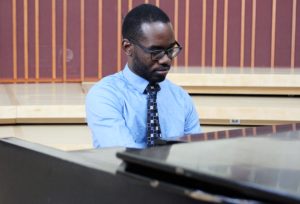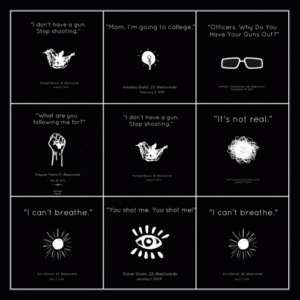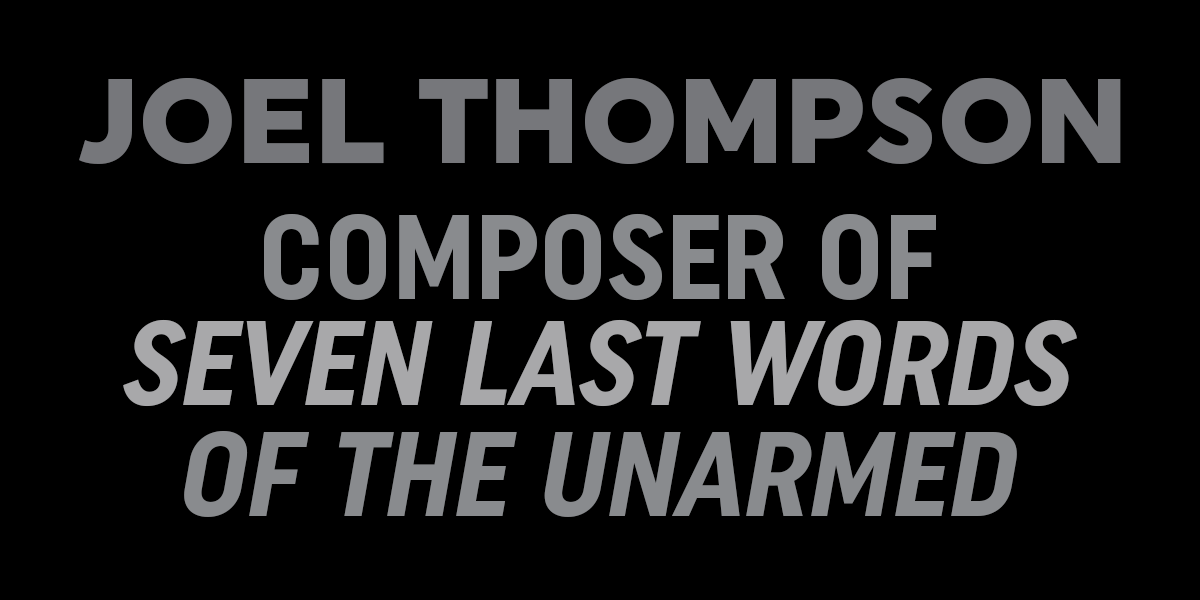In November of 2014, a Staten Island grand jury chose not to indict the officer whose actions led to the death of Eric Garner. To me, the message was clear.
 Any doubts I had seemed to evaporate. If I were to be killed in some interaction with authority figures, my loved ones should not expect justice. There could be a video recording of my futile attempts to describe my distress – “I can’t breathe” – with the arm of the law around my neck and the life fading from my eyes, and still, my death wouldn’t matter. My death wouldn’t matter enough to warrant a formal charge of even manslaughter or negligent homicide. This was not an isolated incident – this was a trend. The color of my skin is a capital offence. To me, the message was clear. Any doubts I had seemed to evaporate. If I were to be killed in some interaction with authority figures, my loved ones should not expect justice. There could be a video recording of my futile attempts to describe my distress – “I can’t breathe” – with the arm of the law around my neck and the life fading from my eyes, and still, my death wouldn’t matter. My death wouldn’t matter enough to warrant a formal charge of even manslaughter or negligent homicide. This was not an isolated incident – this was a trend. The color of my skin is a capital offence.
Any doubts I had seemed to evaporate. If I were to be killed in some interaction with authority figures, my loved ones should not expect justice. There could be a video recording of my futile attempts to describe my distress – “I can’t breathe” – with the arm of the law around my neck and the life fading from my eyes, and still, my death wouldn’t matter. My death wouldn’t matter enough to warrant a formal charge of even manslaughter or negligent homicide. This was not an isolated incident – this was a trend. The color of my skin is a capital offence. To me, the message was clear. Any doubts I had seemed to evaporate. If I were to be killed in some interaction with authority figures, my loved ones should not expect justice. There could be a video recording of my futile attempts to describe my distress – “I can’t breathe” – with the arm of the law around my neck and the life fading from my eyes, and still, my death wouldn’t matter. My death wouldn’t matter enough to warrant a formal charge of even manslaughter or negligent homicide. This was not an isolated incident – this was a trend. The color of my skin is a capital offence.
 Seven Last Words of the Unarmed wasn’t written to be heard. It was essentially a sonic diary entry expressing my fear, anger, and grief in the wake of this tragedy. I was serving as director of choral studies and assistant professor of music at Andrew College in Cuthbert, Georgia and my musical life mostly consisted of conducting and piano, but I occasionally composed pieces and hid them away. Finishing this work in early January 2015 was a much-needed catharsis; I felt exorcised of the emotions that had drained my spirit. However, Freddie Gray’s death the following April urged me to try to bring Seven Last Words of the Unarmed to life. A Facebook post asking musician friends to sightread the work, a phone call by a friend to Dr. Eugene Rogers of the University of Michigan, a commission from Andre Dowell to fully orchestrate the work for the 20th anniversary of the Sphinx Organization, and the piece is alive five years later and I am very grateful.
Seven Last Words of the Unarmed wasn’t written to be heard. It was essentially a sonic diary entry expressing my fear, anger, and grief in the wake of this tragedy. I was serving as director of choral studies and assistant professor of music at Andrew College in Cuthbert, Georgia and my musical life mostly consisted of conducting and piano, but I occasionally composed pieces and hid them away. Finishing this work in early January 2015 was a much-needed catharsis; I felt exorcised of the emotions that had drained my spirit. However, Freddie Gray’s death the following April urged me to try to bring Seven Last Words of the Unarmed to life. A Facebook post asking musician friends to sightread the work, a phone call by a friend to Dr. Eugene Rogers of the University of Michigan, a commission from Andre Dowell to fully orchestrate the work for the 20th anniversary of the Sphinx Organization, and the piece is alive five years later and I am very grateful.
Liturgical settings of the Seven Last Words of Christ are not attempting to demonize the Roman soldiers that orchestrated the crucifixion, but they are designed to stir within the listener an empathy towards the suffering of Jesus. Similarly, this piece is not an anti-police protest work; it is really a meditation on the lives of these black men and an effort to focus on their humanity, which is often eradicated in the media to justify their deaths.
Listening to Seven Last Words of the Unarmed can be uncomfortable. As you listen, I ask that you try to remain open. It can be easy to let a spirit of defensiveness pollute the experience of the piece. I ask that you revisit the last moments of these men with fresh hearts:
- the retired Marine who accidentally pressed his Life Alert necklace which recorded the police calling him a n***er before he was killed,
- the teenage boy with his bag of Skittles being chased in his own neighborhood,
- the young immigrant who called his mother in Guinea after he had saved up enough money to pursue a degree in computer science,
- the recent high school graduate and amateur musician whose body lay baking in the street for four hours before being taken to the coroner,
- the young father (of a 4-year-old girl) who was shot in the back while handcuffed in a prone position at Fruitvale Station,
- the other young father who was purchasing a BB gun for his son in a Wal-Mart in the open carry state of Ohio, and
- the 43-year-old grandfather who was choked to death on camera on the streets of New York City.
